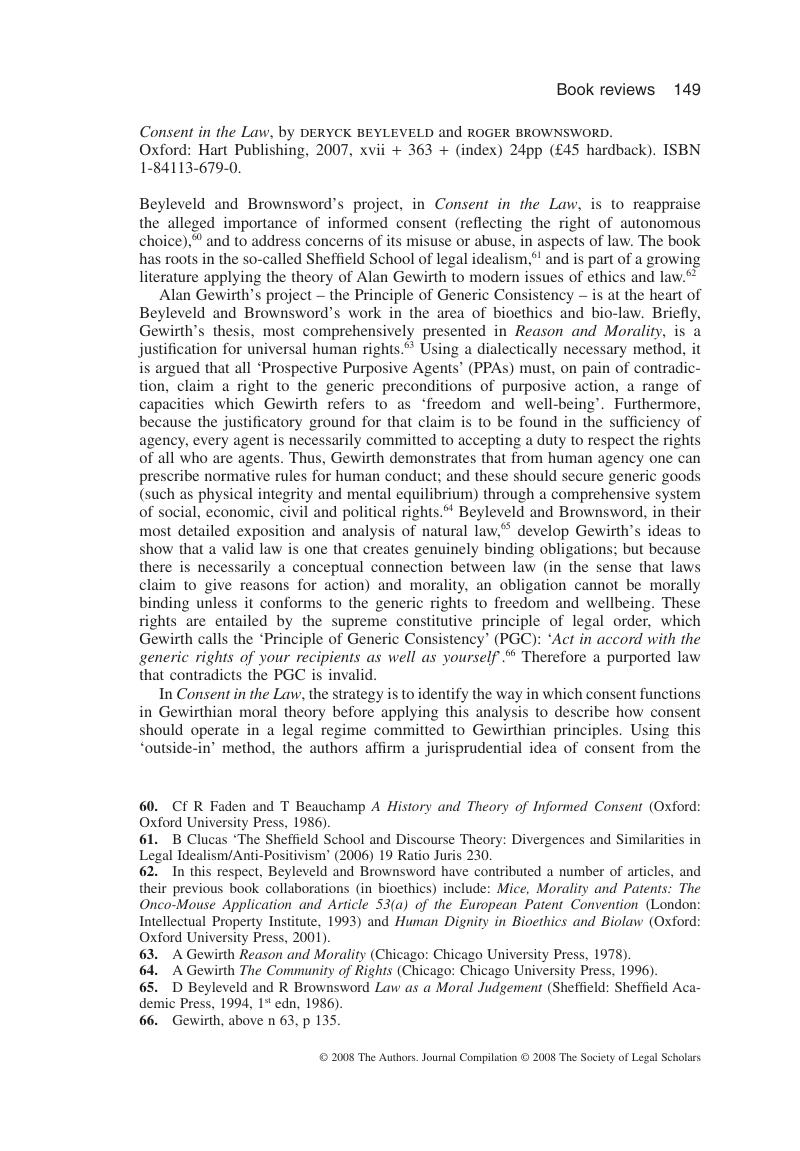No CrossRef data available.
Published online by Cambridge University Press: 02 January 2018

60. Cf R Faden and T Beauchamp A History and Theory of Informed Consent (Oxford: Oxford University Press, 1986).
61. B Clucas ‘The Sheffield School and Discourse Theory: Divergences and Similarities in Legal Idealism/Anti-Positivism’ (2006) 19 Ratio Juris 230.
62. In this respect, Beyleveld and Brownsword have contributed a number of articles, and their previous book collaborations (in bioethics) include: Mice, Morality and Patents: The Onco-Mouse Application and Article 53(a) of the European Patent Convention (London: Intellectual Property Institute, 1993) and Human Dignity in Bioethics and Biolaw (Oxford: Oxford University Press, 2001).
63. A Gewirth Reason and Morality (Chicago: Chicago University Press, 1978).
64. A Gewirth The Community of Rights (Chicago: Chicago University Press, 1996).
65. D Beyleveld and R Brownsword Law as a Moral Judgement (Sheffield: Sheffield Academic Press, 1994, 1st edn, 1986).
66. Gewirth, above n 63, p 135.
67. Connecting theory to practice using an ‘outside in’ method involves constructing an ethical theory (in the case of Gewirth, from purposive agency), and then to apply that theory to concrete problems. An ‘inside out’ approach proceeds from the opposite direction; R Dworkin Life's Dominion (London: HarperCollins, 1993) p 29.
68. R Brownsword ‘Bioethics Today, Bioethics Tomorrow: Stem Cell Research and the “Dignitarian Alliance”’ (2003) 17 Notre Dame Journal of Law Ethics and Public Policy 15.
69. This statement describes consent as a kind of action, and is premised on the dialectically necessary method employed by Gewirth. For a being to have rights (described as will-claim rights), it must have the necessary and sufficient conditions of agency which entail being able to (prospectively) act freely and to make its own choices with regard to the intended purposes of its actions as well as the means (such as giving consent) to achieve those purposes.
70. There are a number of cases which stray from the ideal-typical agent, and therefore the procedural validity of the consent. These are discussed as ‘ruled out in principle’, where there is no developed capacity to consent, and ‘ruled out in practice’, where a being is unable to communicate its will; Beyleveld and Brownsword, Consent in the Law, pp 98–114. Beyleveld and Brownsword describe the way that the courts have traditionally dealt with ‘non-ideal-typical’ subjects of consent, such as substituted judgement, proxy and best interest, concluding that errors occur due to the temptation to fictionalise consent, deny the opportunity to exercise consent (through paternalism), and to use consent as a perfunctory or premature excuse. In Chapters 5, 6 and 7, the conditions for a legal system to pronounce valid consent are analysed.
71. Beyleveld and Brownsword's analysis is drawn from their own detailed account of non-agency and moral obligation in Human Dignity in Bioethics and Biolaw, above n 62.
72. Cf O O'Neill Autonomy and Trust in Bioethics (Cambridge: Cambridge University Press, 2002) pp 47–48.
73. Beyleveld and Brownsword, Consent in the Law, p 136.
74. Ibid, p 314.
75. Cf J Habermas Legitimation Crisis (Cambridge: Polity Press, 1988).
76. Cf J Finnis‘Natural Law and the Ethics of Discourse’ (1999) 12 Ratio Juris 354; and F Michelman ‘Constitutional Legitimation for Political Acts’ (2003) 66 MLR 1.
77. Primarily through the analysis of Habermas' ‘ideal speech situation’ and Dworkin's ‘discriminatory moral position’; See J Habermas ‘Towards a Theory of Communicative Competence’ in Recent Sociology No 2, H Dreitzel (ed) (New York: Macmillan, 1970) pp 114–148; R Dworkin Taking Rights Seriously (New Impression) (London: Duckworth, 2004) pp 248–252.
78. Beyleveld and Brownsword, Consent in the Law, p 363.
79. Ibid, p 323. A minor criticism is that Beyleveld and Brownsword play down the importance of the procedural turn in regard to the filtering and interpretation of facts, which reasonable but fallible reasoners should ideally recognise. Thus where one is given the opportunity to take part in political governance, fair methods of procedure allow agents to change the state of affairs, and thereby agents consent to these procedures or are expected to reject the very nature of democracy. If they choose to exercise their rights in this respect (or refrain from political participation), they can hardly complain that they did not consent to fair procedures if they are unsuccessful in getting their way. However, the ‘fanatic’, who is willing to sacrifice everything (and anyone) to achieve what they value, will see little sense in taking part from the outset. The nature of democracy includes ‘constitutional consensus’ on political procedures of democratic government, which is less broad and deep than overlapping consensus; cf J Rawls Political Liberalism. Expanded Editions (New York: Columbia University Press, 2005) pp 158–172. This argument can be taken further by connecting such consensus to ideas of the ‘public good’; cf B Capps ‘Authoritative Regulation and the Stem Cell Debate’ (2008) 22 Bioethics 43.
80. But because the conditions necessary for the exercise of any rights are the generic conditions of agency, the PGC becomes the legitimating factor for procedural ethics; Beyleveld and Brownsword, Consent in the Law, p 329.
81. Beyleveld and Brownsword, Consent in the Law, p 52.
82. As Stephen Brown argues, ‘This, of course, is possible, but given there is no universal consensus on where Gewirth has gone wrong, combined with the scrupulous and detail reasoning Gewirth and others have used to defend the argument, I suggest there may be more to it than the critics have suggested’; S Brown ‘Alan Gewirth: An Obituary’ (2004) 4 Studies in Social and Political Thought 88–95; for a detailed analysis and defence of the PGC, see D Beyleveld The Dialectical Necessity of Morality (Chicago: Chicago University Press, 1991).
83. K Nielsen ‘Against Ethical Rationalism’ in E Regis Jr (ed) Gewirth's Ethical Rationalism: Critical Essays with a Reply by Alan Gewirth (Chicago: University of Chicago Press, 1984) pp 59–83.